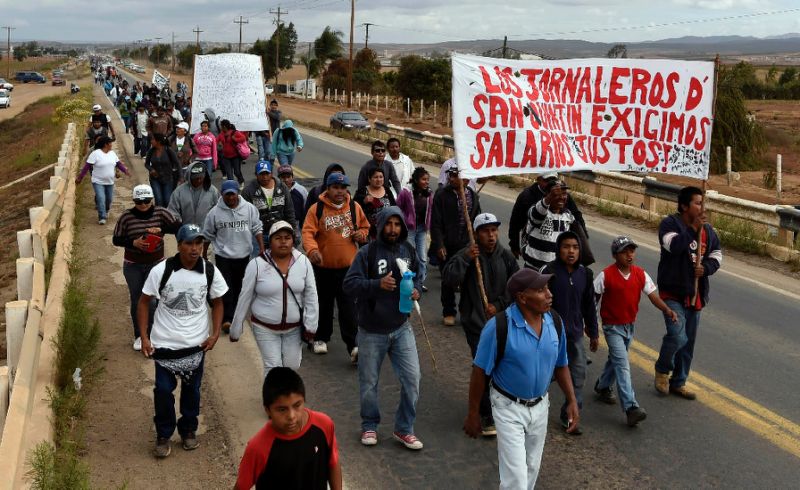PHOTO: Farm workers in Baja California, Mexico, April 24, 2015 (Alfredo Estrella/AFP)
Ruth Ayslim Valderrabano Martinez — columnist at the Mexican Times digital newspaper, International Relations Secretary at the Mexican Farmworkers Confederation, and an advisor of the Mexican Secretariat of Foreign Affairs — writes for EA, with translation by EA WorldView’s Digital Media Editor Ellis Palmer Babe:
Mexico is currently going through one of the most difficult economic and social stages of its history. It is in an international environment that is only concerned with consolidating an economic establishment that speculates through investment in peripheral countries, obtaining large amounts of resources that often go to the wealthiest in the first world.
The elites seem to live in a bubble that paints a society that does not correspond to the reality of the difficult and precarious lives of the vast majority of Mexicans. The chances of improving jobs, dealing with the increasing threat to the minimum conditions of decency, are almost non-existent.
Mexico has a society where many toil day in, day out to give their families basic standards of living and opportunities. But all too often, monetary and fiscal policies only deal with macroeconomic variables to gleefully show off to international organizations, while doing little to improve the lives of the workers. Internal control measures are brutal and devastating as the minimum wage: more than 50% live in poverty, and those living on less than a dollar a day — extreme poverty — make up between 10% and 25% of the population. It is a disgrace that should not be allowed.
We are immersed in a market economy that does not allow us to develop our own talent when the world is heading towards an economy based on knowledge and innovation. National companies, regardless of whether they are based in rural or urban areas, face unfair practices, as international organizations such as the World Trade Organization often rule against local companies in favor of trans-national corporations.
Towards Social Cohesion and Sustainable Development
Social cohesion is a necessity for the viability of democratic governance; citizen consensus is essential for a government that is open, transparent, and accountable. The challenge is to bridge the gap of social equity, eliminating extreme poverty, but we do not have leaders with the vision of statesmen. They put off dealing with social issues, rather than tackling them head on, in a managerialist vision that is focused on present factional interests rather than the future good of the country.
We lack a model that brings about the collaboration of all our citizens, that defends local projects against transnational corporations, that promotes our regional and national industries with social learning, through negotiation, association, and networking in local communities.
Mexico needs to develop business management models with intelligent social organization, with the responsibility and collaboration of citizens and with flexibility in production, marketing, and rates of return. The company must migrate to the mind, with skills based in technology, multitasking, and polyvalent knowledge. It must form entrepreneurial intellectual capital and skills of learning and innovation. To promote sustainable regional development, proposals must come from the diverse rural and urban communities that businesses serve, rather than from the needs of transnational capital. Mexico needs to move from being America’s factory to becoming its own knowledge-driven economy.
The message that should reach all public servants is that they must act so local communities and government have a stronger relationship. We must have a future in which we learn from all of our different communities, in which we educate all of our citizens equally to give them a fair shot at life.
If we did not know our past, or if we imagined it with apathy, if we did not know what so many Mexicans have done to give us the motherland we have today, we would not know what to do to rebuild a social fabric that gives all our citizens “meaningful lives, which are personally desirable and collectively fair and free”.
But we do know this. And, amid all the challenges, we know what can and should be done to create a sustainable 21st-century Mexico that represents all of its citizens, not just the wealthy elites. We know how we can become a truly diverse and democratic nation.






